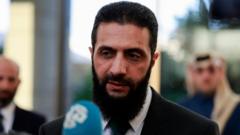During a Sunday interview with Saudi state broadcaster Al Arabiya, rebel leader Ahmed al-Sharaa revealed that new elections in Syria could be delayed for up to four years. This statement marks the first indication of a timeline for elections since HTS's successful rebel campaign against Assad's regime. He explained that drafting a new constitution alone could take nearly three years, and significant improvements in public services might not surface for at least a year.
Al-Sharaa, who previously went by the name Abu Mohammed al-Jolani, now heads the newly recognized leadership in Syria. He emphasized the need for a comprehensive population census to facilitate legitimate elections and the urgent rebuilding of the country's legal system. Although HTS started as a militant jihadist group, it has taken steps to modify its approach and distance itself from its violent origins. He confirmed that the organization would be "dissolved" during an upcoming national dialogue conference, which could become pivotal in unifying the diverse country amid ongoing tensions.
Addressing criticism of his transitional government, Al-Sharaa asserted that the appointments made were critical for progress, aimed at inclusivity while ensuring stability. He reassured the public that the rights and freedoms of Syria's ethnic and religious minorities, which include Kurds, Armenians, and Assyrians, will be safeguarded.
In conjunction with the political changes, recent reports by a UK-based war monitor revealed nearly 300 arrests of Assad loyalists in response to the changing guard in power. Local populations cooperated with authorities in identifying pro-regime informants and militia members, leading to raids that uncovered arms caches.
Al-Sharaa, who previously went by the name Abu Mohammed al-Jolani, now heads the newly recognized leadership in Syria. He emphasized the need for a comprehensive population census to facilitate legitimate elections and the urgent rebuilding of the country's legal system. Although HTS started as a militant jihadist group, it has taken steps to modify its approach and distance itself from its violent origins. He confirmed that the organization would be "dissolved" during an upcoming national dialogue conference, which could become pivotal in unifying the diverse country amid ongoing tensions.
Addressing criticism of his transitional government, Al-Sharaa asserted that the appointments made were critical for progress, aimed at inclusivity while ensuring stability. He reassured the public that the rights and freedoms of Syria's ethnic and religious minorities, which include Kurds, Armenians, and Assyrians, will be safeguarded.
In conjunction with the political changes, recent reports by a UK-based war monitor revealed nearly 300 arrests of Assad loyalists in response to the changing guard in power. Local populations cooperated with authorities in identifying pro-regime informants and militia members, leading to raids that uncovered arms caches.



















